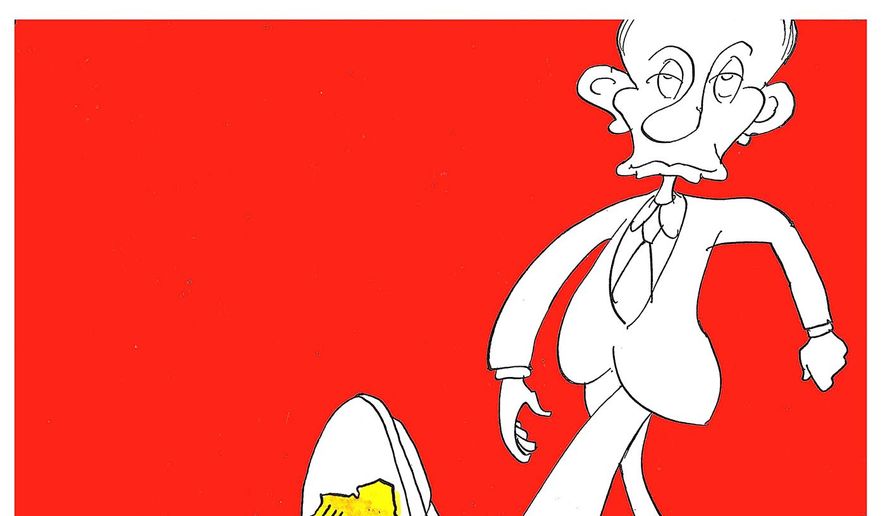OPINION:
Last week, two Russian long-range bombers skirted the southwest coast of England. British Typhoon warplanes scrambled from their base to “escort” the bombers away. Prime Minister David Cameron accused Moscow of “trying to make some sort a point.”
Yes, probably so. Among other things, Vladimir Putin is reportedly angry over British Foreign Secretary Michael Fallon’s warning that Russia now represents a “real and present danger.” The Russian president, he fears, might do to one of NATO’s Baltic members — Estonia, Latvia and Lithuania — what he has done to Ukraine.
Coincidently, a committee of the House of Lords last week issued a report: “The EU and Russia: Before and beyond the crisis in Ukraine.” The committee’s chairman, Lord Christopher Tugendhat, summed up: “The EU, and by implication the U.K., was guilty of sleepwalking into this crisis.”
He added: “The Committee is also concerned that the U.K.’s expertise within the Foreign Office [translation: its Putinology] has diminished significantly. The lack of robust analytical capacity, in both the U.K. and the EU, effectively led to a catastrophic misreading of the mood in the run-up to the crisis.”
I’ve not convinced that Mr. Putin is quite so hard to read. Part czar, part commissar, he is a committed autocrat, not an aspiring democrat. His ambition is to restore Russia’s status as a great power — by any means necessary. That resonates with many of his countrymen — as he well knows.
His most immediate goal appears to be re-establishing Russia’s Eurasian sphere of influence. He might have accomplished that without invasions, violence and the seizure of territory, just by making Ukraine, Georgia and other formerly Soviet territories increasingly dependent on the Kremlin. But, Mr. Putin, like Tina Turner, never does “nice and easy” when he can do “nice and rough” instead.
He views conflicts as binary: one side wins, the other loses — there are no “win-wins.” Nor are there “resets” based on both sides making compromises. Diplomacy is not the path to conflict resolution; it is war by other means. He respects strength and finds weakness repugnant — and provocative. “The weak,” he has observed, “get beaten.”
Fraser Cameron, director of the Brussels-based EU-Russia Centre, asked in a column last week: “Is Russia ready to play by the international rule book, especially the sanctity of borders in post-war Europe?” Could the answer be more obvious? Mr. Cameron added: “Russia will also have to accept that every state has the right to decide its own destiny including membership of the EU.”
I think Mr. Putin would reply: “Who is going to make Russia accept that?” About 40,000 of his supporters said something very akin to that when they rallied last Saturday in Moscow. Among them, The Associated Press reported, were “ultranationalist bikers, pensioners, war veterans, members of student organizations and activists from other pro-Kremlin groups. Many waved Russian flags, others bore banners that said ’Die, America’ or ’U$A, Stop the War!’” The war they have in mind is Ukraine’s failing struggle to retain its independence, to not become a Russian colony.
As Lenin might ask: What is to be done? In this instance, we should look to the root causes among which, I’d argue, is the breakdown of the liberal, rules-based international order. At the conclusion of World War II, there were two great powers: the United States and the Soviet Union. Their competition was not without pain and peril but there were constraints. Because neither side sought martyrdom, the possibility of mutually assured destruction served as a deterrent.
With the fall of the Berlin Wall, the United States accepted the burden of global leadership. Soon, however, there were voices on both the left and the right arguing for America to relinquish that responsibility. President Obama has made that his policy. Since he’s been in office, he has been “leading from behind,” deferring to the “international community.”
The problem is that no such community exists. The United Nations Security Council includes Russia and China, nations with interests and values quite different from those of the multicultural, morally relativist, demilitarizing West. Tyrants and despots dominate the U.N. General Assembly.
We now know for certain that the end of the Cold War did not mean the end of history. We also know that Mr. Putin intends to make history in Eurasia and also in the Middle East where he is helping defend Syrian dictator Bashar Assad and enabling the rulers of the Islamic Republic of Iran who have their own regional and global ambitions.
“Revisionist great powers are never satisfied,” writes the Brookings Institution’s Robert Kagan, a former speechwriter for George Shultz, secretary of state under President Reagan. “Their sphere of influence is never quite large enough to satisfy their pride or their expanding need for security.”
He adds: “If the United States wants to maintain a benevolent world order, it must not permit spheres of influence to serve as a pretext for aggression. The United States needs to make clear now — before things get out of hand — that this is not a world order that it will accept.”
To achieve that, however, requires more than speeches declaring some particular act of aggression — e.g., by Russia, Syria, Iran or North Korea — “unacceptable” and then, in time, accepting it as though it had been inevitable all along. The stronger America’s military and economic power, and the more credible America’s willingness to deploy that power, the less frequently that power will need to be deployed.
Until that paradox is understood and incorporated into policy, expect to see Mr. Putin testing Western limits in the air and on the ground, Iran’s theocrats spinning more centrifuges, North Korea launching more missiles and jihadis posting acts of flamboyant barbarism on YouTube.
• Clifford D. May is president of the Foundation for Defense of Democracies and a columnist for The Washington Times.




Please read our comment policy before commenting.